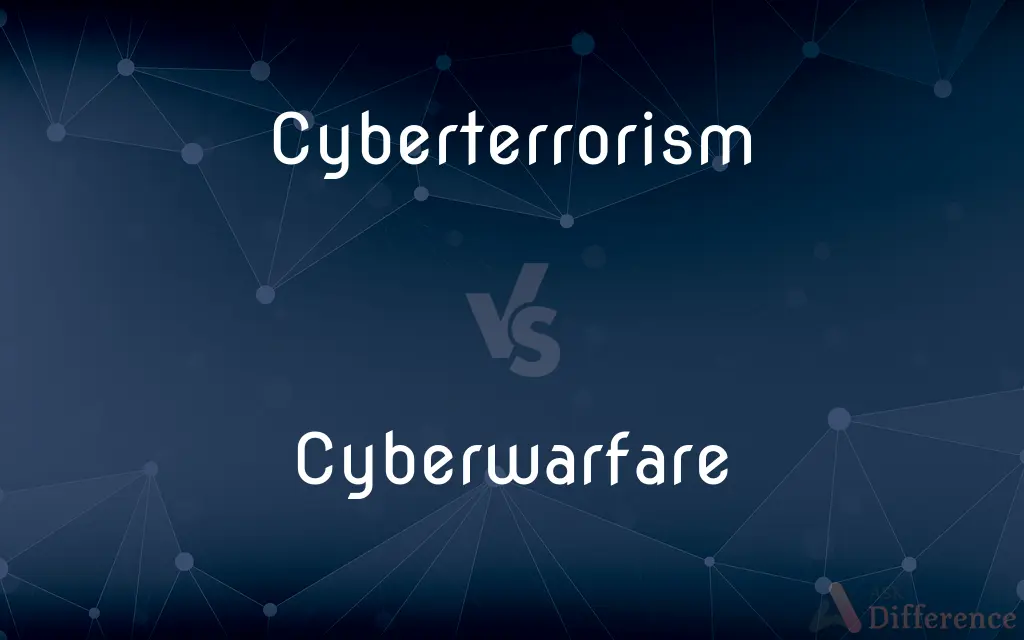Cyberterrorism vs. Cyberwarfare — What's the Difference?
By Tayyaba Rehman & Fiza Rafique — Updated on April 4, 2024
Cyberterrorism involves use of internet to conduct violent acts that threaten fear in order to achieve political or ideological goals. Cyberwarfare is state-sponsored or state-conducted cyber attacks against another nation to disrupt, damage, or spy.

Difference Between Cyberterrorism and Cyberwarfare
Table of Contents
ADVERTISEMENT
Key Differences
Cyberterrorism is characterized by attacks from non-state actors, such as terrorist groups, aiming to instill fear, harm civilians, or achieve political, religious, or ideological objectives through the disruption or destruction of digital infrastructure. These acts are designed to break public confidence and can target critical national infrastructures such as power grids, financial systems, or government networks. On the other hand, cyberwarfare involves the strategic use of digital attacks by one nation-state against another, to damage, disrupt, or spy on enemy networks as part of military operations or espionage activities. It can serve as both a component of traditional warfare and a standalone means of asserting national power, often blurring the lines between civilian and military targets.
While both cyberterrorism and cyberwarfare utilize similar tools and techniques, such as malware, ransomware, and denial-of-service attacks, their actors, motives, and targets differ significantly. Cyberterrorists often seek to publicize their cause or coerce governments through fear, whereas cyberwarfare aims at gaining strategic advantages, disrupting military operations, or stealing state secrets without necessarily seeking public attention for those actions.
The implications of cyberterrorism are largely societal and psychological, focusing on inducing terror, disrupting daily life, and undermining confidence in national security. In contrast, cyberwarfare carries geopolitical implications, with the potential to disrupt military capabilities, damage economies, and affect diplomatic relations, often forming part of a larger strategy of statecraft and national defense.
Cyberterrorism poses a significant challenge to national security, requiring counterterrorism strategies that include intelligence gathering, cybersecurity measures, and international cooperation. Similarly, defending against cyberwarfare demands robust cyber defenses, the development of offensive cyber capabilities, and diplomatic efforts to establish international norms and agreements on cyber conduct.
Understanding the distinction between cyberterrorism and cyberwarfare is crucial for developing effective policy responses, security protocols, and international cooperation frameworks. Both threats highlight the evolving nature of conflict and security in the digital age, underscoring the importance of advancing cybersecurity measures and international collaboration to mitigate risks and protect against digital threats to national and global security.
ADVERTISEMENT
Comparison Chart
Actors
Non-state actors, terrorist groups.
Nation-states or state-sponsored actors.
Objectives
Political, ideological, religious goals; instill fear.
Strategic advantage, disruption of military operations, espionage.
Targets
Civilian infrastructure, public confidence.
Military, governmental, economic systems; can also affect civilians.
Motives
Coercion, intimidation, publicity for a cause.
Gaining or maintaining strategic advantage, undermining enemy capabilities.
Tools/Techniques
Malware, ransomware, DDoS attacks.
Malware, cyber espionage tools, DDoS attacks, cyber sabotage.
Implications
Societal disruption, fear, economic damage.
Military disruption, economic espionage, diplomatic tensions.
Defense Strategies
Intelligence, cybersecurity, international cooperation.
Cyber defense, offensive cyber capabilities, diplomatic agreements.
Compare with Definitions
Cyberterrorism
Motivated by a desire to publicize a cause or achieve political change.
Defacing government websites with ideological messages.
Cyberwarfare
Can be used to undermine economic strength or steal sensitive information.
Hacking into another country's financial institutions to destabilize the economy.
Cyberterrorism
The use of cyber attacks by non-state actors to terrorize or coerce societies for ideological goals.
Hacking a national power grid to cause blackouts and spread fear.
Cyberwarfare
State-conducted or sponsored cyber operations against other nations as part of conflict.
Disrupting an adversary's military communications through cyber means.
Cyberterrorism
Targets often include civilian infrastructure to maximize public impact.
Infecting hospital systems with ransomware to disrupt healthcare services.
Cyberwarfare
Reflects the strategic use of digital technology in statecraft and military operations.
Launching preemptive cyber attacks to weaken an enemy before conventional military action.
Cyberterrorism
Represents a blend of traditional terrorism tactics with modern technology.
Using social media to coordinate attacks and spread propaganda.
Cyberwarfare
Often part of broader military strategy, including espionage and sabotage.
Planting malware in enemy defense systems to gather intelligence or cause malfunction.
Cyberterrorism
Defense involves both technological solutions and counter-terrorism intelligence.
International collaborations to monitor and prevent cyber attacks from known terrorist groups.
Cyberwarfare
Requires comprehensive national security measures for defense.
Developing advanced cybersecurity protocols to protect critical military and civilian networks.
Cyberterrorism
Cyberterrorism is the use of the Internet to conduct violent acts that result in, or threaten, the loss of life or significant bodily harm, in order to achieve political or ideological gains through threat or intimidation. Acts of deliberate, large-scale disruption of computer networks, especially of personal computers attached to the Internet by means of tools such as computer viruses, computer worms, phishing, malicious software, hardware methods, programming scripts can all be forms of internet terrorism.
Cyberwarfare
Cyberwarfare is the use of cyber attacks against an enemy state, causing comparable harm to actual warfare and/or disrupting vital computer systems. Some intended outcomes could be espionage, sabotage, propaganda, manipulation or economic warfare.
Cyberterrorism
(computing) The deliberate, large-scale disruption of networks of computers, especially of computers attached to the Internet, by means of viruses etc.
Cyberwarfare
Warfare taking place on the Internet, as by disrupting critical online services.
Common Curiosities
How do cyberterrorists choose their targets?
They target civilian infrastructure and public services to maximize fear and societal disruption, seeking publicity for their causes.
How is the international community addressing cyberterrorism and cyberwarfare?
Through cybersecurity alliances, international law, and cooperative defense strategies to enhance digital security and establish norms for state behavior in cyberspace.
What are the objectives of cyberwarfare?
To gain strategic military advantages, disrupt enemy operations, engage in espionage, and weaken the opponent's economic or political stability.
What differentiates cyberterrorism from cyberwarfare?
Cyberterrorism is carried out by non-state actors with ideological motives, targeting civilians to create fear, whereas cyberwarfare is conducted by nation-states against other nations for strategic advantage.
Can cyberwarfare occur independently of physical conflict?
Yes, cyberwarfare can precede, accompany, or occur independently of traditional military conflict, often as part of strategic rivalry.
What makes cyber attacks an attractive tool for terrorists?
Their relative anonymity, low cost, high impact potential, and the ability to bypass traditional security measures make cyber attacks appealing to terrorists.
How do cyberterrorism and cyberwarfare impact global security?
They represent evolving threats that challenge traditional notions of security and warfare, requiring adaptive strategies and international cooperation to mitigate risks.
Are civilians affected by cyberwarfare?
While the primary targets are military and strategic, civilians can also be affected, especially when attacks disrupt economic systems or civilian infrastructure.
How do countries defend against cyberwarfare?
By investing in cybersecurity infrastructure, developing offensive and defensive cyber capabilities, and participating in international cybersecurity initiatives.
What role does cybersecurity play in preventing cyberterrorism?
It's crucial for detecting, preventing, and responding to cyberterrorist attacks, protecting national infrastructure, and ensuring public safety.
Share Your Discovery

Previous Comparison
Patience vs. Endurance
Next Comparison
Subsidy vs. SubventionAuthor Spotlight
Written by
Tayyaba RehmanTayyaba Rehman is a distinguished writer, currently serving as a primary contributor to askdifference.com. As a researcher in semantics and etymology, Tayyaba's passion for the complexity of languages and their distinctions has found a perfect home on the platform. Tayyaba delves into the intricacies of language, distinguishing between commonly confused words and phrases, thereby providing clarity for readers worldwide.
Co-written by
Fiza RafiqueFiza Rafique is a skilled content writer at AskDifference.com, where she meticulously refines and enhances written pieces. Drawing from her vast editorial expertise, Fiza ensures clarity, accuracy, and precision in every article. Passionate about language, she continually seeks to elevate the quality of content for readers worldwide.














































